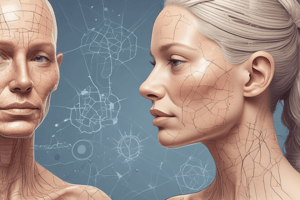Podcast
Questions and Answers
Define dermatology.
Define dermatology.
Medical branch of science that deals with the study of skin and its nature, structure, functions, diseases and treatment.
Briefly describe healthy skin.
Briefly describe healthy skin.
Healthy skin should be free of any visible signs of disease, infection or injury. Slightly moist, soft and flexible. Smooth, fine-grained texture. Slightly acidic.
Name the two main divisions of the skin and the layers within each division.
Name the two main divisions of the skin and the layers within each division.
Epidermis: stratum corneum, stratum lucidum, stratum granulosum, stratum spinosum, stratum germinativum; Dermis: papillary layer, reticular layer.
List the three types of nerve fibers found in the skin.
List the three types of nerve fibers found in the skin.
The skin can be nourished with cosmetic products.
The skin can be nourished with cosmetic products.
What are collagen and elastin?
What are collagen and elastin?
Explain how collagen and elastin can be weakened.
Explain how collagen and elastin can be weakened.
Name the two types of glands contained within the skin and describe their functions.
Name the two types of glands contained within the skin and describe their functions.
What are the six important functions of the skin?
What are the six important functions of the skin?
What are the six classes of nutrients that the body needs and how are they obtained?
What are the six classes of nutrients that the body needs and how are they obtained?
What are the five basic food groups?
What are the five basic food groups?
Name four vitamins that can help the skin and describe how they help.
Name four vitamins that can help the skin and describe how they help.
What is the one essential item that no person can live without? Why is it essential to the skin and body?
What is the one essential item that no person can live without? Why is it essential to the skin and body?
Flashcards
Dermatology
Dermatology
The medical study of skin, its structure, functions, diseases, and treatments.
Healthy Skin
Healthy Skin
Skin free from disease or injury, slightly moist, soft, flexible, smooth, fine-grained, with a slightly acidic pH.
Epidermis
Epidermis
Outer layer of skin, with 5 layers.
Dermis
Dermis
Signup and view all the flashcards
Collagen
Collagen
Signup and view all the flashcards
Elastin
Elastin
Signup and view all the flashcards
Vitamin A
Vitamin A
Signup and view all the flashcards
Vitamin C
Vitamin C
Signup and view all the flashcards
Sudoriferous Glands
Sudoriferous Glands
Signup and view all the flashcards
Sebaceous Glands
Sebaceous Glands
Signup and view all the flashcards
Skin Nourishment
Skin Nourishment
Signup and view all the flashcards
Skin Functions
Skin Functions
Signup and view all the flashcards
Water
Water
Signup and view all the flashcards
Study Notes
Dermatology and Skin Health
- Dermatology is the medical field focused on skin study, encompassing its structure, functions, diseases, and treatments.
- Healthy skin is free from signs of disease or injury; it is slightly moist, soft, flexible, smooth, fine-grained, and has a slightly acidic pH.
Structure of Skin
- The skin consists of two main divisions:
- Epidermis: Comprising five layers – stratum corneum, stratum lucidum, stratum granulosum, stratum spinosum, and stratum germinativum.
- Dermis: Includes two layers – papillary layer and reticular layer.
Nerve Fibers in the Skin
- There are three types of nerve fibers:
- Motor nerve fibers control movement.
- Sensory nerve fibers transmit sensation.
- Secretory nerve fibers regulate glandular secretion.
Skin Nourishment
- The skin does not obtain nourishment from cosmetic products; it requires nutrients from food.
Proteins in Skin
- Collagen: A fibrous protein providing skin strength and form.
- Elastin: A protein that creates elastic tissue, maintaining skin flexibility.
Factors Weakening Collagen and Elastin
- Weakening factors include aging, moisture loss, UV damage, weight fluctuations, and gravity.
Skin Glands and Functions
- Sudoriferous (sweat) glands: Excrete perspiration and detoxify the body.
- Sebaceous (oil) glands: Secrete sebum for skin lubrication and hair softness.
Functions of the Skin
- Six key functions:
- Protection
- Sensation
- Heat regulation
- Excretion
- Secretion
- Absorption
Essential Nutrients
- Six classes of nutrients essential for health:
- Carbohydrates
- Fats
- Proteins
- Vitamins
- Minerals
- Water
- These nutrients are derived from food and beverages.
Basic Food Groups
- Five basic food groups:
- Grains
- Vegetables
- Fruits
- Milk
- Meat, poultry, fish, and beans
Vitamins Beneficial for Skin
- Four important vitamins and their benefits:
- Vitamin A: Improves skin elasticity and thickness; supports repair and health of skin cells.
- Vitamin C: Essential for skin repair, collagen production, and fighting aging.
- Vitamin D: Aids calcium absorption; promotes skin healing.
- Vitamin E: Protects against UV damage and supports skin health.
Importance of Water
- Water is vital for overall health; it sustains cell health, aids toxin elimination, regulates temperature, and supports digestion.
Studying That Suits You
Use AI to generate personalized quizzes and flashcards to suit your learning preferences.




